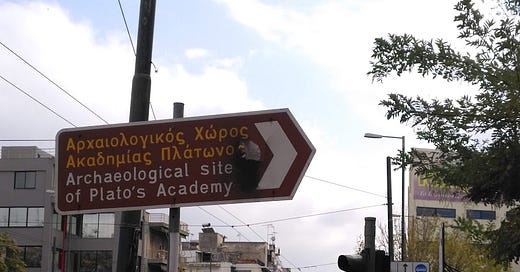This is a talk given by Donald at the original location of Plato’s Academy, in what is now Plato’s Academy Park, near the centre of Athens. He discusses the history of the park from Socrates, through Plato, to the Stoics, and what the future may hold, describing the plans of the Plato’s Academy Centre to create a conference centre near the original location of Plato’s school.
Transcript
This is a talk that I delivered in the grounds of Plato’s Academy Park in Athens, in September 2022, as part of a four-day event organized by the Aurelius Foundation and YPO or Young Presidents Organization. The mayor of Athens also spoke that day about the importance of celebrating this historic location, near the city centre. Our nonprofit startup, The Plato’s Academy Centre was created in Greece in order to raise awareness of the area, and we hope, ultimately, to help create a new conference centre there so people can come from all over the world to do philosophy and benefit from ancient wisdom, at the original location of Plato’s Academy.

Philosophy at Plato’s Academy Park
Behold Where on the Aegean shore a city stands, Built nobly; pure the air, and light the soil; Athens, the eye of Greece, mother of the arts And eloquence, native to famous wits, Or hospitable, in her sweet recess, City, or suburban, studious walks and shades: See there the olive grove of Academe, Plato’s retirement, where the Attic bird Trills her thick-warbled notes the summer long…
That’s how the English poet, John Milton, envisages this place in his epic Paradise Regained.According to legend this area, known as Akadimia, originally belonged to, and was therefore named after, the Greek hero Akademos. He reputedly saved Athens from being sacked by the Spartans, when Helen of Troy was still a child, according to legend. So the land became sacred to his memory. Over the years it was cultivated into a public area of pleasant olive groves, and gardens, with streams, running-tracks and popular walks shaded under the trees. Over time, a palaestra or wrestling school was built here, the ruined foundations of which can still be seen in the grounds of the park. It could perhaps be described as an ancient Athenian recreational ground, although in addition to sports facilities, there would have been shrines and libraries here. Young men exercised here in the nude, and older men walked among the groves, discussing politics and philosophy.
The Academy was destined, as you know, to become synonymous with philosophy, and more famous than Coca Cola because, ever since, down to the present day, every other academy in the world bears its name. Every single one of you has heard of this place. And every thinker, every politician, every psychologist, that you admire, thinks and speaks as they do, at least in some small part, because a few hundred of their ancient predecessors were schooled where you’re now standing.
Socrates
The Academy is justifiably famous for being the home of Plato’s school, the first institute of higher learning in European history. However, as we walk here, we’re following in the footsteps of many other great philosophers, not just Plato. Perhaps most importantly of all, from time to time, Socrates himself walked here, long before Plato, his most famous student, was even born, posing questions about the nature of wisdom and what it means to live well. Plato’s dialogue named Lysis opens with Socrates walking from the Academy to the Lyceum, and we’re told he often discoursed on philosophy in the gymnasia of Athens as well as in the Agora, and in the homes of his friends. We’re bound to imagine Socrates strolling under the trees here, casually discussing philosophy with his acquaintances.
Plato
Plato was a young man about twenty years old when he first encountered Socrates. He became his devoted student and remained so for eight years, until Socrates was executed, forced to drink hemlock, in 399 BC. Plato must have felt utterly disillusioned by Athenian politics and the way his mentor had been treated. He left Athens, travelling to other regions where he studied with other philosophers. On his return to Athens, about twelve years later, his friend and patron, Dion of Syracuse, it is said, “bought for Plato the little garden which is in the Academy”, where he made his home, and based his school, consecrated with a shrine to the nine Muses. We’re therefore told that Plato “lived in the Academy, which is a gymnasium outside the walls, in a grove named after a certain hero, [Akademos]” (Diogenes Laertius).
Plato spent the next four decades teaching philosophy here. He had many students. The most famous was, of course, Aristotle, who came here aged seventeen, and studied at Plato’s Academy for twenty years, although he would later set up his rival school in a gymnasium at the other side of the city, called the Lyceum, part of which is now a pleasant garden, open to visitors. Can you imagine Plato and Aristotle, the two most brilliant minds of antiquity, walking among these trees, talking most intensely with one another, about the nature of wisdom, for two whole decades?
When Plato died we’re told he was buried in the Academy, and a huge procession of his students turned out for the funeral ceremony. A statue of him was erected here by his friends, and a tomb, which bore the following epitaph:
Earth hides Plato’s body in her bosom, But his soul has an immortal station with the blessed. Ariston’s son, whom every good man, though living far off, Honors for glimpsing the divine life.
Later another epitaph was composed for him, which reads as follows…
Eagle, why do you swoop over this tomb? Tell me, Do you gaze at the starry house of one of the gods?
The eagle replying, says,
I am an image of the soul of Plato, which has flown to Olympus, While his earth-born body lies in Attic soil.
This is the resting place, in other words, of the most celebrated philosopher in history. His remains may still be beneath our very feet.
Zeno
For centuries, the Academy remained a centre for the study of philosophy, and, indeed, a beacon of civilization in the ancient world. It had quite a colourful history. For instance, a generation or so after Plato’s death, so the story goes, there was a wayward youth called Polemon who would hide bags of money in the grounds of the Academy “to procure”, we’re told, “the immediate gratification of his desires”.
Polemon was a drunkard, perhaps an alcoholic. One day he burst into a lecture on philosophy, intoxicated and reeking of wine, with a garland on his head. The lecture on temperance, being delivered by one of Plato’s successors, was so persuasive, though, that young Polemon abandoned his hedonistic lifestyle and adopted the ways of a model student. After years of industrious study, he actually became himself the head of the Academy. His self-control became so legendary that it was said he remained unmoved even when bitten on the thigh by a rabid dog, though his friends were panicked on his behalf.
Polemon’s story is that of an intemperate young man who managed to turn his life around and ended up becoming renowned as a philosopher and a role model to others. We’re told that he chose to withdraw from society and, it is said, to “confine himself to the Garden of the Academy, while close by his scholars made themselves little huts and lived not far from the shrine of the Muses and the lecture-hall.”
The Academy’s name is synonymous with the philosophy of Plato but it also plays an important part in the history of the Stoic philosophy, which you came here to learn about. Around the same time that Polemon staggered drunk into the Platonic Academy, a Phoenician merchant, called Zeno of Citium, was shipwrecked at the nearby port of Pireaeus. Having reputedly lost his entire fortune at sea, Zeno turned to the study of philosophy. He began as a Cynic philosopher but later came here to the Academy, where he studied for around a decade. Zeno gradually began to build a reputation himself as an expert on dialectic, or logic. However, he continued to attend lectures at the Academy delivered by Plato’s successors, including Polemon.
Zeno was therefore admired for showing intellectual humility by attending the public lectures of a famous rival philosopher. Nevertheless, Polemon is said to have joked: “You do not escape my notice, Zeno, slipping in by the garden door, stealing my doctrines and clothing them in a Phoenician style!” If that’s true, Stoicism originally bore the imprint of the Academy, as mediated by Polemon, a recovering alcoholic, who had hit rock bottom, but found his salvation in Plato’s philosophy. Perhaps one day another drunk will stumble through this park into a philosophy lecture, stay just long enough to sober up, and emerge transformed into a budding future sage.
After studying philosophy at the Academy, for roughly a decade, Zeno, taking inspiration both from Plato’s followers and the Cynics, founded his own Stoic school, in a public building called the Stoa Poikile, located in the Agora of Athens. Zeno’s school, as you know, flourished, and became, along with Aristotle’s Lyceum, one of the main rivals of Academic philosophy. Toward the end of his life, two pillars were erected as monuments to him in the grounds of the Academy and Lyceum. They bore an inscription commemorating his exemplary virtue and temperance, and honoring his contributions to philosophy. It reads as follows:
Whereas Zeno of Citium, son of Mnaseas, has for many years been devoted to philosophy in the city and has continued to be a man of worth in all other respects, exhorting to virtue and temperance those of the youth who come to him to be taught, directing them to what is best, affording to all in his own conduct a pattern for imitation in perfect consistency with his teaching, it has seemed good to the people – and may it turn out well – to bestow praise upon Zeno of Citium, the son of Mnaseas, and to crown him with a golden crown according to the law, for his goodness and temperance, and to build him a tomb in the Ceramicus at the public cost.
That pillar with its decree commemorating the founder of Stoicism once stood around here somewhere, in the grounds of this park, where Zeno had originally been an eager student of philosophy, just like all of you.
Sulla
Over the following centuries, Greek influence in the Mediterranean was slowly eclipsed by the emerging Roman state. In 86 BC, three centuries after Plato founded his school here, the Roman dictator Sulla besieged the city of Athens. He was not a philosopher. The Athenians sent envoys who begged him to spare the glorious city from ruin but Sulla replied: “I was sent to Athens, not to take lessons, but to reduce rebels to obedience.” His troops occupied the Academy, outside the city walls, gutting its buildings, and cutting down the trees for timber to make war machines for a long and brutal siege. Sulla ordered the whole city to be sacked, including all of its temples. Precious texts were probably looted and sold overseas, or simply destroyed. The philosophical schools of Athens never fully recovered.
About seven years later, the Roman orator, Cicero, a lover of philosophy, visited Athens, and found the ruins of the Academy deserted. Listen to what he says because his experience, of walking in the footsteps of Plato, though written two thousand years ago, may be no different than your own…
When we reached the walks of the Academy, which are so deservedly famous, we had them entirely to ourselves, as we had hoped. Thereupon Piso [my friend] remarked: "Whether it is a natural instinct or a mere illusion, I can't say; but one's emotions are more strongly aroused by seeing the places that tradition records to have been the favorite resort of men of note in former days, than by hearing about their deeds or reading their writings. My own feelings at the present moment are a case in point. I am reminded of Plato, the first philosopher, so we are told, that made a practice of holding discussions in this place; and indeed the garden close at hand yonder not only recalls his memory but seems to bring the actual man before my eyes.” – Cicero, De Finibus
When I first came to Plato’s Academy Park, I had the same feeling. I imagined that I was walking where Socrates, Plato, Aristotle, and Zeno once walked, discussing the nature of the good life, and laying the foundations of Western philosophy. Cicero doesn’t mention, and it took me some time to realize, that we are also walking in the resting place of Plato, upon the ground where his body lies buried. I don’t believe in ghosts but I don’t see any harm in us stopping to imagine for a few moments that Plato’s still here among us, therefore, in spirit, watching over our conversation about his philosophical legacy, and the future of his beloved Akadimia.
The Future
Nowadays some websites refer to this as a dog park. It’s true that local Athenians walk their dogs here, their children play here, and people jog and do their exercises in the park. Not many tourists come here any more, although it’s only about ten minutes by cab from the centre of Athens. When I came to this park, to be honest, I was surprised that there wasn’t already an international conference centre nearby. It seemed obvious that there should be, but there wasn’t, so I started to wonder if maybe it was just me, just a crazy idea. Then I made the mistake of mentioning this crazy idea to other people.
I asked CEOs, leadership gurus, academics, and other authors, “Would you want to speak at a conference at the original location of Plato’s Academy?” They’d say “Hell, yeah!” Then they’d start to look confused. After a couple of seconds they’d say “Wait a minute… does that even exist?” I’d say yes. They’d say “What’s there?” I’d say “It’s kind of a dog park, with some ruins.” They’d look even more confused. They’d say “Surely you can’t build a conference centre on the ruins?” I’d say, “Yes, but someone could build one near the ruins.” They’d say, “So when are you going to do it?” I hadn’t planned to do it. I was just kind of thinking aloud.
That was just over a year ago. Since then, we’ve incorporated as a nonprofit organization, based in Greece, called the Plato’s Academy Centre. So far we’ve mainly been running virtual events, during the pandemic. This is the first physical event the Plato’s Academy Centre has been involved with, by offering advice and support to YPO and the Aurelius Foundation. Next year, we’re planning to run more events online, and in Athens, and, eventually, we’re hoping this will lead to the creation of a new event space near the park.
Most foreigners, even foreign philosophers, have never actually visited this site. Three years ago, though, Plato’s Academy park was visited by Simon Critchley, a professor of philosophy at the New School for Social Research in New York. He wrote a feature article about it for the New York Times, a newspaper still read by over three hundred thousands Americans. It was titled “Athens in Pieces: The Stench of the Academy”. Prof. Critchley said that on arriving here, he spotted a man standing by himself, “smoking a huge joint with what appeared to be a bottle of water at his feet”, although he wondered if it was alcohol and if everyone around the ruins was, as he puts it, “quietly getting wasted on a Saturday lunchtime.” He concludes:
A faint but clearly perceptible smell of urine hung in the air of the palaestra. On the corner as I looked up, two men were rummaging carefully and quietly through a baby-blue refuse bin.
Prof. Critchley left this place feeling disappointed – it was no longer the glorious Academy of classical Athens. He came here, gazed upon the park, and saw nothing much to his liking. He hopped back in his taxi, and departed for good.
I see something quite the opposite. I wholeheartedly disagree with his appraisal. Each time I return to this park, I see its potential more and more clearly. I find myself in agreement with Cicero and his friend, who once walked in the park, after it had been torn apart by Sulla’s legionaries. I too have seen, in my mind’s eye, Plato walking among these gardens.
These grounds are steeped in history, and that history means something important, something urgent, something lacking from today’s society. Something magical that cannot be eradicated by Sulla, or by a cranky article in the New York Times. We just have to look a little bit more closely to see it for ourselves – we have to give the Academy more of a chance, if we ever want to see it again, and this place, because of its history, deserves our attention.
You, my friends, have walked along the same paths as Plato, and his great mind, in a sense, has been your companion here. At least, perhaps, for a moment, you may have experienced something, conscious that the warm Athenian air you’re breathing in and out right now once resonated with the gentle voice of Socrates as he asked a crowd of boyish students, young Plato foremost among them, what it means to be a good man, what it means to be wise, and what it means to live well.
I am an image of the soul of Plato, which has flown to Olympus, While his earth-born body lies in Attic soil.
You, my friends, gathered here today, are likewise an image… an imperfect image though it may be… an image of Plato’s Academy… an image of those ancient thinkers who once gathered here to discuss philosophy with Plato, and perhaps you are also an image of those who are yet to arrive here, who will discuss Socrates and Plato and Aristotle, and all branches of philosophy here, in the future, in years to come.
















Share this post